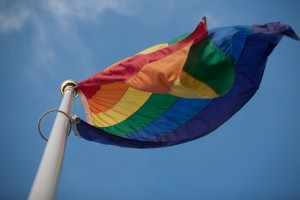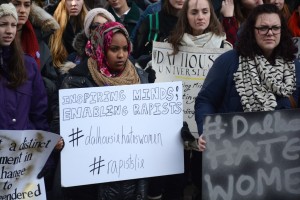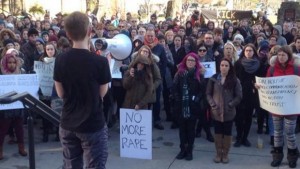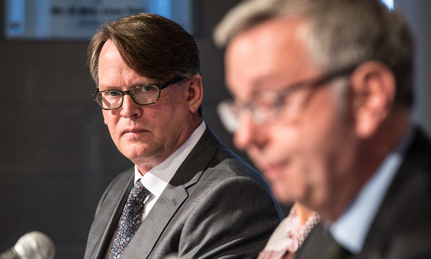Democracy Now!, September 9, 2014– As the fall school term begins, an Illinois college campus is embroiled in one of the nation’s biggest academic freedom controversies in recent memory. The University of Illinois at Urbana-Champaign has sparked an outcry over its withdrawal of a job offer to a professor critical of the Israeli government. Steven Salaita was due to start work at the university as a tenured professor in the American Indian Studies Program. But after posting a series of tweets harshly critical of this summer’s Israeli assault on Gaza, Salaita was told the offer was withdrawn. The school had come under pressure from donors, students, parents and alumni critical of Salaita’s views, with some threatening to withdraw financial support. Thousands of academics have signed petitions calling for Salaita’s reinstatement, and several lecturers have canceled appearances in protest. The American Association of University Professors has called the school’s actions “inimical to academic freedom and due process.” A number of Urbana-Champaign departments have passed votes of no-confidence in the chancellor, Phyllis Wise. And today, Urbana-Champaign students will be holding a campus walkout and day of silence in support of Salaita. We are joined by two guests: Columbia University law professor Katherine Franke, who has canceled a lecture series at Urbana-Champaign in protest of Salaita’s unhiring; and Kristofer Petersen-Overton, a scholar who went through a similar incident in 2011 when Brooklyn College reversed a job offer after complaints about his Middle East views, only to reinstate it following a public outcry.
TRANSCRIPT
This is a rush transcript. Copy may not be in its final form.
AARON MATÉ: As the fall school term begins, an Illinois college campus is embroiled in one of the nation’s biggest academic freedom controversies in recent memory. The University of Illinois at Urbana-Champaign has sparked an outcry over its withdrawal of a job offer to a professor critical of the Israeli government. Steven Salaita was due to start work at Urbana-Champaign as a tenured professor in the American Indian Studies Program. But after posting a series of tweets harshly critical of the summer’s assault on Gaza, Salaita was told the offer was withdrawn. Urbana-Champaign has come under pressure from donors, students, parents and alumni critical of Salaita’s views, with some threatening to withdraw financial support.
The move has been criticized both in and outside of the school, with administrators accused of political censorship. Thousands of academics have signed petitions calling for Salaita’s reinstatement, and several lecturers have canceled appearances in protest. The American Association of University Professors has called the school’s actions “inimical to academic freedom and due process.” A number of school departments have passed votes of no-confidence in the chancellor, Phyllis Wise. And today, students will be holding a campus walkout and a day of silence in support of Salaita. A news conference is being held, where Salaita is expected to make his first public comments since his unhiring last month.
AMY GOODMAN: In a public statement, Chancellor Phyllis Wise said her decision to unhire Salaita “was not influenced in any way by his positions on the conflict in the Middle East nor his criticism of Israel.” She goes on to write, quote, “What we cannot and will not tolerate at the University of Illinois are personal and disrespectful words or actions that demean and abuse either viewpoints themselves or those who express them,” unquote. The school has now reportedly offered Salaita a financial settlement for his troubles. The school’s Board of Trustees is expected to take up the controversy at a meeting on Thursday.
For more, we’re joined by two guests. Kristofer Petersen-Overton is an adjunct lecturer of political science at Lehman College. In 2011, Brooklyn College initially decided not to hire Petersen-Overton as an adjunct professor for a seminar on Middle East politics. But the school reversed its decision after criticism that the decision was politically motivated. And Katherine Franke joins us. She’s a professor of law at Columbia University and the director of the Center for Gender and Sexuality Law. She recently canceled a lecture series at the University of Illinois at Urbana-Champaign in protest of Steven Salaita’s unhiring.
Professor Franke, let’s begin with you. Talk about the facts of this case and how you got involved.
KATHERINE FRANKE: Well, Professor Salaita was previously a professor at Virginia Tech University, and he had a well-known dossier of books and articles thinking critically about the relationship between indigeneity, meaning native people, and the political environments in which they live—hard questions about dispossession, belonging, state violence and identity. And because of that important scholarly record, the University of Illinois went after him—in a friendly way, unlike what they’re doing now. And he was hired by an overwhelming vote by the American Indian Studies Program there in the normal way that we hire faculty in universities. An offer letter was issued to him. He accepted it. They paid for his moving expenses. He quit his job, a tenured position in Virginia. And he has a small child and a family and a wife, and was ready to move. His course books had been ordered. He had been invited by the university to the faculty welcome luncheon.
And then, on August 1st, he got a letter from the chancellor saying, “We’re sorry, we’re not going to be able to employ you here, because I haven’t taken the last step, which I had not informed you about before, of taking your candidacy to the Board of Trustees.” He had assumed he had an accepted job offer. He had relied on that offer—and at his peril. He now doesn’t have a home, doesn’t have a job and doesn’t have an income.
So what we now have learned, through a FOIA request and the disclosure of emails at the university, is that there was enormous pressure put on the chancellor and the Board of Trustees by large donors of the university, who said, “I’ll take my six-figure donations away if you hire this guy.” And this is as a result of some tweets that Professor Salaita made over the summer during the heat of the Gaza—the Israeli assault on Gaza. He was very upset about it. He himself is Palestinian. He was watching children die and the destruction of Gazan villages that we all watched. And like many of us, he was quite impassioned and used colorful language on Twitter to express his views, and that those tweets somehow made their way to donors at the University of Illinois. And so, the job, as been described even here in the setup, is either withdrawn or somehow not—well, what has happened is he’s just been fired. And so he’s now organizing, along with the rest of us, a response to what is a deliberate campaign by a number of political operatives who put pressure on universities like the University of Illinois to censor critical scholarship, critical comments, critical research about Israeli state policy.
Read More: Democracy Now!

 Follow
Follow



